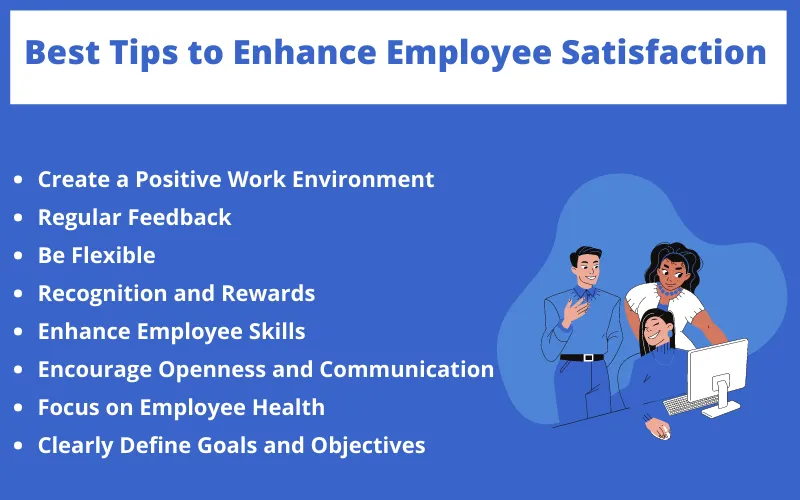Best Tips to Enhance Employee Satisfaction That Leads to Better Productivity!
Best Tips to Enhance Employee Satisfaction That Leads to Better Productivity!
“A good work culture and work environment are very crucial in helping your employees to put their best foot forward.”
Employee satisfaction is the happiness or fulfillment an employee experiences at work. A happy, engaged, and motivated employee contributes to the company’s success, positively impacting the rest of your staff.
Employee attitudes often reflect the company’s culture. Employee satisfaction is important in customer service and sales since they represent the business to the public. But satisfaction is not entirely determined by monetary compensation.
Glassdoor’s research in 2015 states that an increase in salary of 10% led to the rise of 1 point in employee happiness. Researchers also found that company culture, career opportunities, and leadership are more important than salary alone.
According to studies, nearly two-thirds of employed individuals(65.07%) will actively seek new employment in 2022. Only 3.5% of people say they have no plans to change jobs this year. 46.88% are either dissatisfied with their work or grateful to have a job. Only 15.79 % of workers said they were “very satisfied” with their jobs.
Finding ways to improve and build job satisfaction for employees must be on the corporate agenda to assure continuous success, especially with staff loyalty, productivity, and engagement increasingly ranking as the most pressing problems for modern-day business.
While improving employee satisfaction isn’t a cure-all, it can have tremendous impacts on your company.
Job satisfaction is influenced by various factors, including autonomy, flexibility, recognition, a sense of belonging, and a positive relationship with one’s boss. It’s impossible to satisfy all your employees.
It is essential to work harder to improve job satisfaction. Happy employees create more productivity and positively influence the company’s bottom line.
Employee satisfaction is evident these days. It has a significant influence on your organization – everything from your capacity to recruit and retain people to the quality of your product and customer service – and is now a major determining factor in your company’s overall success.
It might not be easy to measure and improve employee satisfaction properly. We’ve discussed the best tips to enhance employee satisfaction, leading to better productivity.
Let’s get started!
What is Employee Satisfaction?

Employee satisfaction measures an employee’s happiness towards work and company culture.
A high level of employee happiness in the workplace helps to avoid employee burnout and keep employees motivated to become excellent in their position. With a high level of employee satisfaction, an organization can strengthen retention and engagement.
Prioritizing employee satisfaction will increase the organization’s bottom line profits, lower employee turnover, and improve company performance and employee productivity.
Why Does Employee Satisfaction Matter?
Satisfied employees are those who remain positive at work. They are energetic, productive, and committed to contributing to the organization’s objectives.
It has been shown that better job satisfaction leads to improved organizational productivity, lower employee turnover, and reduced job stress.
Many reasons exist for employers to be concerned with their employee team’s overall happiness and welfare.
Studies have shown that employee satisfaction is correlated with profitability. Essentially, if you’re looking to boost your company’s financial performance, one way to do so is by increasing your staff’s happiness.
Benefits of employee satisfaction include:
- Productivity and Quality Work are Increased
According to a study by the University of Warwick, people who are happy at work are more productive. Researchers conducted several experiments to test whether happy employees will work harder, and found that happiness makes employees 12% more productive.
- Reduced Employee Turnover
When employees are completely satisfied with their jobs, they are less likely to quit. A high level of job satisfaction is associated with a low intention to leave, and low job satisfaction is associated with a high intention to leave.
- Improved Workplace Morale
A company with high employee satisfaction creates a positive and supportive work environment.
- Enhanced Employee Motivation
If employees feel appreciated and recognized at work, they are more motivated and driven to perform well, which leads to productivity.
Must Read: Proven ways to motivate employees
Top Reasons Employees Become Dissatisfied

A dissatisfied employee is unhappy with their job or has negative feelings toward the company they work for. This can be due to various professional reasons.
Job dissatisfaction can grow due to a variety of reasons like:
- Being Underpaid
The primary reason for job dissatisfaction is when employees feel underpaid. They could conclude by researching what others are paid doing the same job in the same place.
- Unsupportive or Untrustworthy Boss
Whenever you have a boss who is unsupportive and continually asks you about your task and questions regarding where you are going and who you will be meeting with.
Then it’s a strong indication that your boss doesn’t trust you. Employees are likely to become dissatisfied when this occurs.
- Ineffective Leadership
Whenever there is no supervision and effective leadership, the employees’ morale suffers, and their satisfaction and engagement are affected. Goals become unclear, and productivity suffers.
- No Growth Opportunities
Growth opportunities are important to employee engagement. However, if there are no opportunities for growth, employees become dissatisfied and seek another job.
Best Tips to Enhance Employee Satisfaction

1. Create a Positive Work Environment
A positive work environment greatly influences employees’ attitudes. The work environment has a major impact on employee motivation.
It has a big impact on their professional life. It reflects in their work and helps them stay positive throughout the day.
A positive work environment encompasses more than just the structure of the company. It is an employee’s overall experience with coworkers, direct supervisors, and business culture.
The best way to create a positive working environment is through open communication with employees and coworkers.
Developing trust, building healthy work relationships, and listening and promoting equal opportunities help create a good working environment.
Must Read: Ways to maintain a healthy work environment
2. Regular Feedback
Your employees, like everyone else, need and crave feedback.
Employee satisfaction depends on feedback, yet most managers are unwilling to provide it. Employees are uncertain about the labor and effort they are putting in due to a lack of feedback.
People’s psychology is complex, and they might interpret the same message or discussion differently.
As a result, managers must learn the art of giving feedback. In the workplace, feedback has a hugely beneficial impact.
It can help establish trust, increase employee satisfaction, keep staff engaged, and lower turnover.
The most effective methods for providing healthy feedback are as follows:
- The intention is to be optimistic.
- It should be beneficial.
- It needs to be genuine.
- Don’t wait; provide feedback immediately.
Must Read: Top customer feedback software and application in 2022
3. Be Flexible
It is important to give employees more control, autonomy, and accountability over their own time at work.
With work-life balance becoming more popular as an employee demand, particularly among the Millennial generation, providing employees with flexible work schedules and the option of telecommuting based on individual requirements is a critical first step.
Allowing employees to come in and leave earlier or later reduces the stress of the daily commute! Regular conversation and friendlier behavior make an employee more devoted to the task, leading to greater productivity.
4. Recognition and Rewards

When you recognize your employees for their hard work, they are more motivated to work even more in the future.
People want to know that their work matters and impacts the client, the team, and the organization.
Employee morale, productivity, and overall job satisfaction improve when employees are rewarded and acknowledged for their efforts.
Office managers must spend time describing how their unique job contributes value in a concrete way, such as how someone’s leadership has influenced the company’s brand voice and contributed to the bottom line. Job satisfaction is boosted by positive reinforcement.
Must Read: Best rewards that your employees love to receive🏆🏆
5. Enhance Employee Skills
When organizations engage in employee development, both the leaders and the company have the chance to grow and invest in the future.
Companies cultivate a talent pool of outstanding, dedicated employees ready for advancement.
One of the characteristics of employee satisfaction is helping employees enhance their skill sets. Allowing your employees to grow their skills improves their job satisfaction and productivity.
This also shows that you care about their professional development in addition to your organization’s growth.
It allows people to learn about workers’ skills, weaknesses, and work cultures and bridge gaps in the future.
It’s always a good idea to evaluate whether your employees desire to learn anything new or require specific training.
Employees are frequently dissatisfied due to a lack of this managerial strategy. They believe they have learned everything there.
6. Encourage Openness and Communication

Employees who feel they haven’t been kept informed about changes in the workplace are unsatisfied. As a result, there is disengagement among employees.
It’s important to take a transparent approach to keep staff informed. Ensure that your employees are informed using internal communication methods or platforms such as intranets, corporate e-mails/newsletters, management cascade meetings, or “town hall” announcements.
Most essential, be genuine in your communication. This means admitting both successes and failures. Don’t underestimate your workers. They’re smart and can detect dishonesty from a mile away.
To be effective in your communication, stay loyal to your personality and your goal as a leader, and don’t be afraid to tell it like it is, especially when circumstances are bad. It will earn you respect among your coworkers.
Must Read: Best ways to enhance team communication
7. Focus on Employee Health
Employee’s mental health is no longer only the individual’s responsibility; because of the high cost to employers, businesses are increasingly duty to encourage and drive good health.
The saying “health equals wealth” is often overused, yet it stays true to its meaning. Employers who do not prioritize their employees’ physical, emotional, psychological, and financial well-being build ineffective teams.
It is critical to create a work culture that responds to the requirements of employees’ health. Fit and stress-free employees are more productive and have a higher sense of responsibility towards their work.
Businesses must give them corporate wellness programs or sessions to promote good culture and monitor their behavior.
8. Clearly Define Goals and Objectives
You might have the best team in the world working for you, but if you don’t set goals and objectives, their excitement will fade. Throughout their work-life cycle, your team needs direction.
Employee dissatisfaction occurs when an organization fails to establish clear objectives or company values.
Goals guarantee that your workers’ efforts are always aligned with the company’s aims and that everyone understands how they contribute.
Employees don’t just work for the money. To be satisfied, they require a feeling of direction and a sense of purpose at work. We all want to perform meaningful work and make a difference at the end of the day.
Conclusion
The ultimate goal of business culture can be achieved when workplaces are filled with excitement, humor, honesty, humility, and activities that foster connection.
Employees can feel satisfied, motivated, and confident. Employees become purpose-driven champions for their company and colleagues.
Companies must be aware of the tips mentioned above to enhance employee satisfaction and engagement. Satisfied employees will always put their best foot forward and improve the bottom line.

 in Melbourne
in Melbourne 
 Employee Screen Monitoring Software
Employee Screen Monitoring Software App and Website Monitoring Software
App and Website Monitoring Software Time and Attendance Software
Time and Attendance Software Finance
Finance Banking
Banking Healthcare
Healthcare Lawyers
Lawyers Retail & ecommerce
Retail & ecommerce Knowledge base
Knowledge base Blogs
Blogs Installation Guide
Installation Guide FAQs
FAQs About
About Media Kit
Media Kit Contact us
Contact us